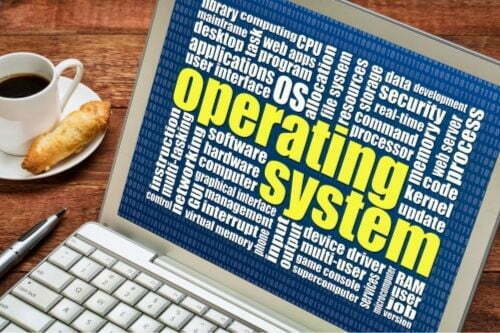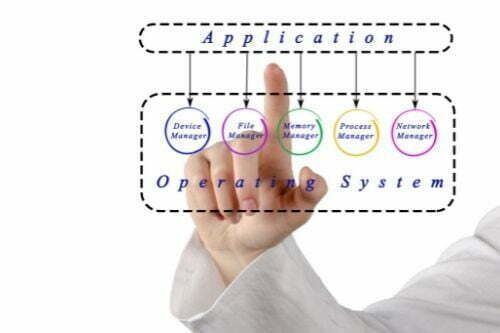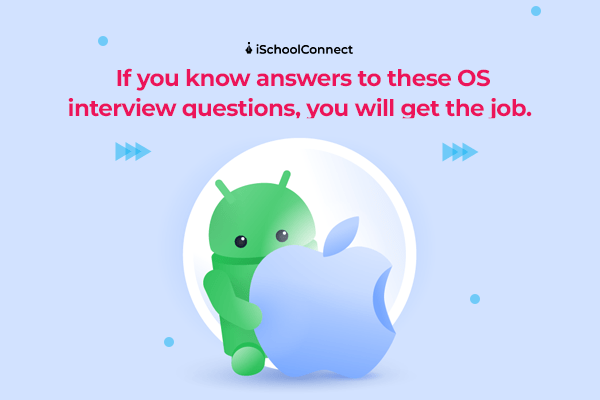Table of Contents
- Q1. Why is an operating system important?
- Q2. According to you, what are the two main purposes of an operating system?
- Q3. What is a socket?
- Q4. What are the different states of a process?
- Q5. What is a thread?
- Q6. What is demand paging?
- Q7. What are the benefits of a multiprocessor system?
- Q8. What is a monolithic kernel?
- Q9. What is the difference between a microkernel and a macro kernel?
- Q10. What is thrashing?
- Key takeaways
- FAQs
An operating system or OS is a software program that manages and operates computing devices, such as smartwatches, network towers, cards, web servers, and computers. An OS significantly eliminates the need to know coding languages to interact with computing devices. Owing to the significant benefits of an operating system, knowledge of the same for interviews for managerial-level positions in the IT industry. Keep reading to learn more about the top 10 most frequently asked OS interview questions to help you prepare!
Knowledge of OS is one of the most basic requirements for high-level technical positions in the IT industry. In certain cases, you will also have a minimum amount of experience with the software, depending on the position you are applying for.
Here are some OS interview questions that you can start preparing-
Q1. Why is an operating system important?

This is one of the most crucial types of OS interview questions that are often asked to help interviewers understand if you can identify the necessity of particular software.
A suitable answer to this question can be as follows –
Answer – An operating system is one of the most essential parts of a computer. This is primarily because it enables an interface and acts as a link for interaction between computer software and users. It also contributes to the communication between hardware, allowing a balance to maintain between hardware and the CPU.
Q2. According to you, what are the two main purposes of an operating system?
This type of OS interview question provides you with room to state your own professional opinion concerning the concept in question.
You can phrase your answer along the following lines –
Answer – One of the most important purposes of an operating system is to ensure that a computer system is performing optimally by managing its various computational activities. Secondly, an OS also provides the right environment needed to develop and execute different programs.
Q3. What is a socket?
This is among the more technical types of OS interview questions you should be able to answer if you have been formally trained in the software.
Answer – A socket is used to establish a connection between two applications. The endpoints of a connection are the sockets.
Q4. What are the different states of a process?
Answer – Processes can exist in one of three states – running, ready, or waiting.
While answering this type of question, you may consider elaborating a little on what each state of a process is. This can help interviewers understand the depth of your knowledge and expertise.
Q5. What is a thread?
Answer – A thread is a single sequence stream present within a process. Since threads also have some of the properties of processes, they are referred to as lightweight processes.
Q6. What is demand paging?

If you have technical experience with OS in the industry, this is among the OS interview questions that you will be able to answer quite easily.
Answer – Demand paging occurs when not all of a process’s pages are in RAM. OS then brings the missing or required pages from the disk into the RAM.
Q7. What are the benefits of a multiprocessor system?
Such kinds of OS interview questions allow interviewers to determine if you can objectively view a concept to determine its advantages and disadvantages. In such types of questions, remember to make a mental note of the disadvantages or drawbacks of the subject. This can most likely be the next question you are asked.
Answer – Multiprocessor systems are used across the industry today as they improve the performance of systems by running multiple programs concurrently. As a result, a larger number of tasks can be accomplished in a smaller period. Multiprocessor systems are also highly cost-effective, as all the processors share the same resources.
Q8. What is a monolithic kernel?
Answer – A monolithic kernel is a kernel that includes all the codes of the operating system in a single executable image.
Q9. What is the difference between a microkernel and a macro kernel?
The ‘state the difference’ types of OS interview questions are among the most tricky kinds of questions that may be asked in an interview for a managerial level role.
Here is a good answer to this question –
Answer – A microkernel is a kernel that runs on minimal performance affecting services for an operating system. A macro kernel, on the other hand, is a combination of both micro and monolithic kernels.
Q10. What is thrashing?
Answer – Thrashing is a situation in which the performance of a computer collapses or degrades. Thrashing often occurs when a system spends more time
than usual processing page faults than executing transactions. Thrashing harms the overall system.
Key takeaways
- Operating systems are among the most widely used system software in the information technology industry.
- Knowledge of OS is, therefore, among the aspects of your skills that are tested in interviews.
- Preparing for interviews well in advance with our list of 10 OS interview questions can be a great way to perform at your most optimal level.
- In some cases, you may need to have a relevant amount of work experience to qualify for a managerial-level position in the industry.
We hope you enjoyed reading this blog. In case of any queries, reach out to us or drop a comment below!
Liked this blog? Read next: MCA course | 7 Things you need to know before pursuing this course!
FAQs
Q1. How many questions will I be asked in a technical interview?
Answer – This is entirely dependent on the interviewers, their assessment of your performance, and how you respond to the questions.
Q2. Can I apply for technical positions without experience in OS?
Answer – Yes, you can. Basic knowledge in OS can help you gain significant employment opportunities in the industry at an early stage in your career. However, you will need relevant experience for higher-level opportunities in the industry.
Q3. What do I do where I do not know the answer to an interview question?
Answer – In such cases, you can let the interviewer know that you are not aware of the answer. If you still want to attempt to answer the question, you can ask for more information or pose a supporting question that will lead you to the correct response.






